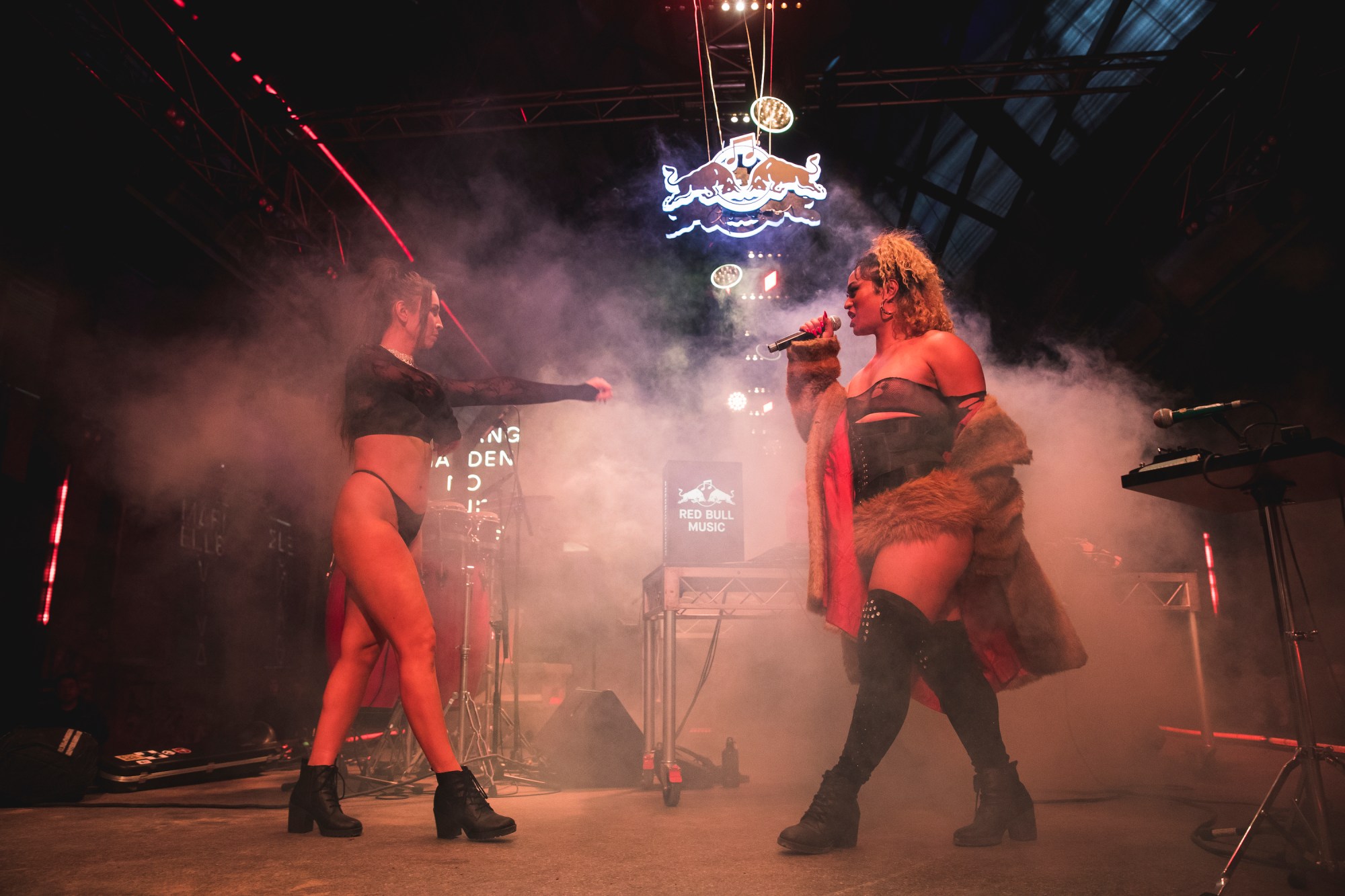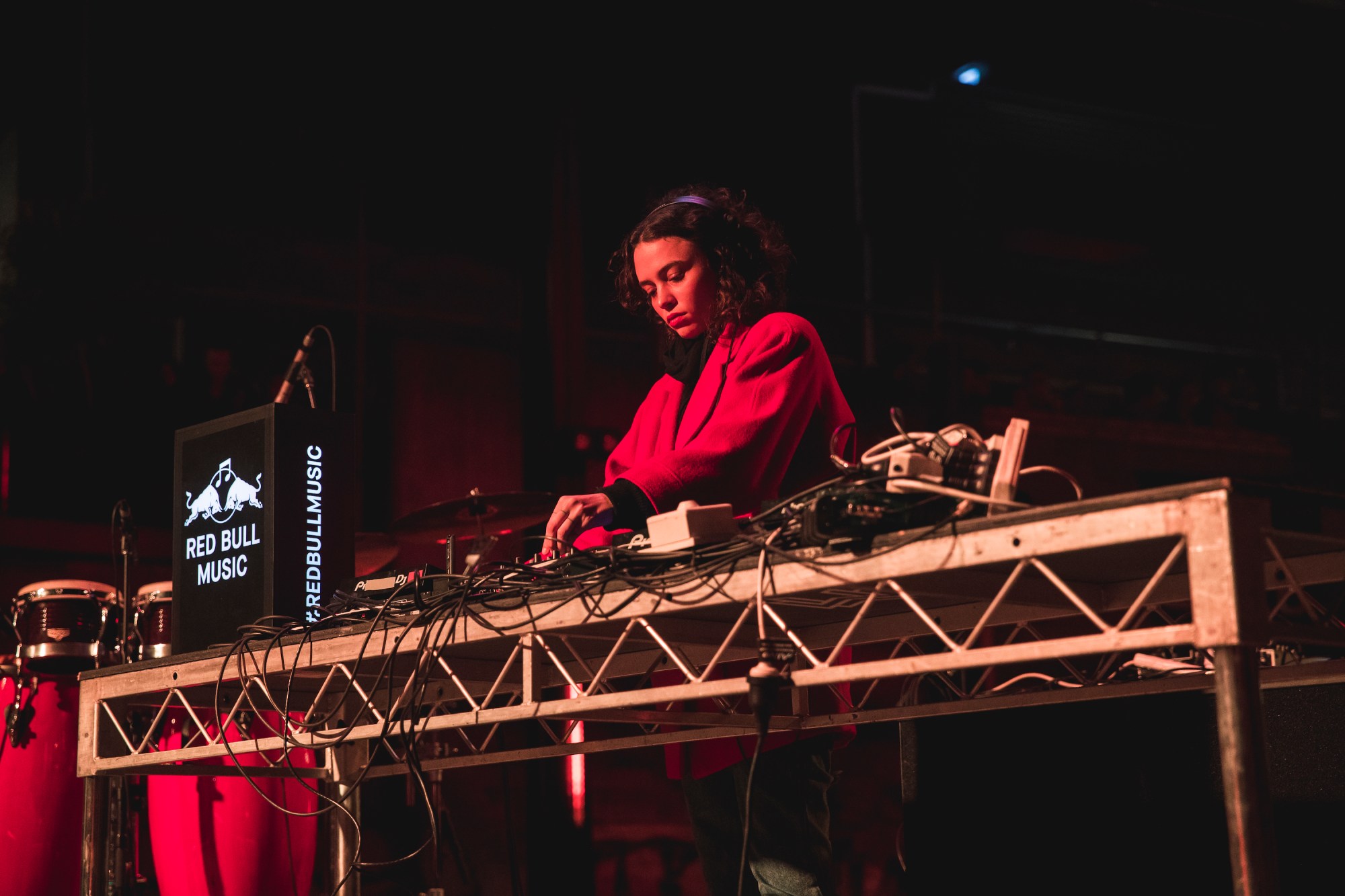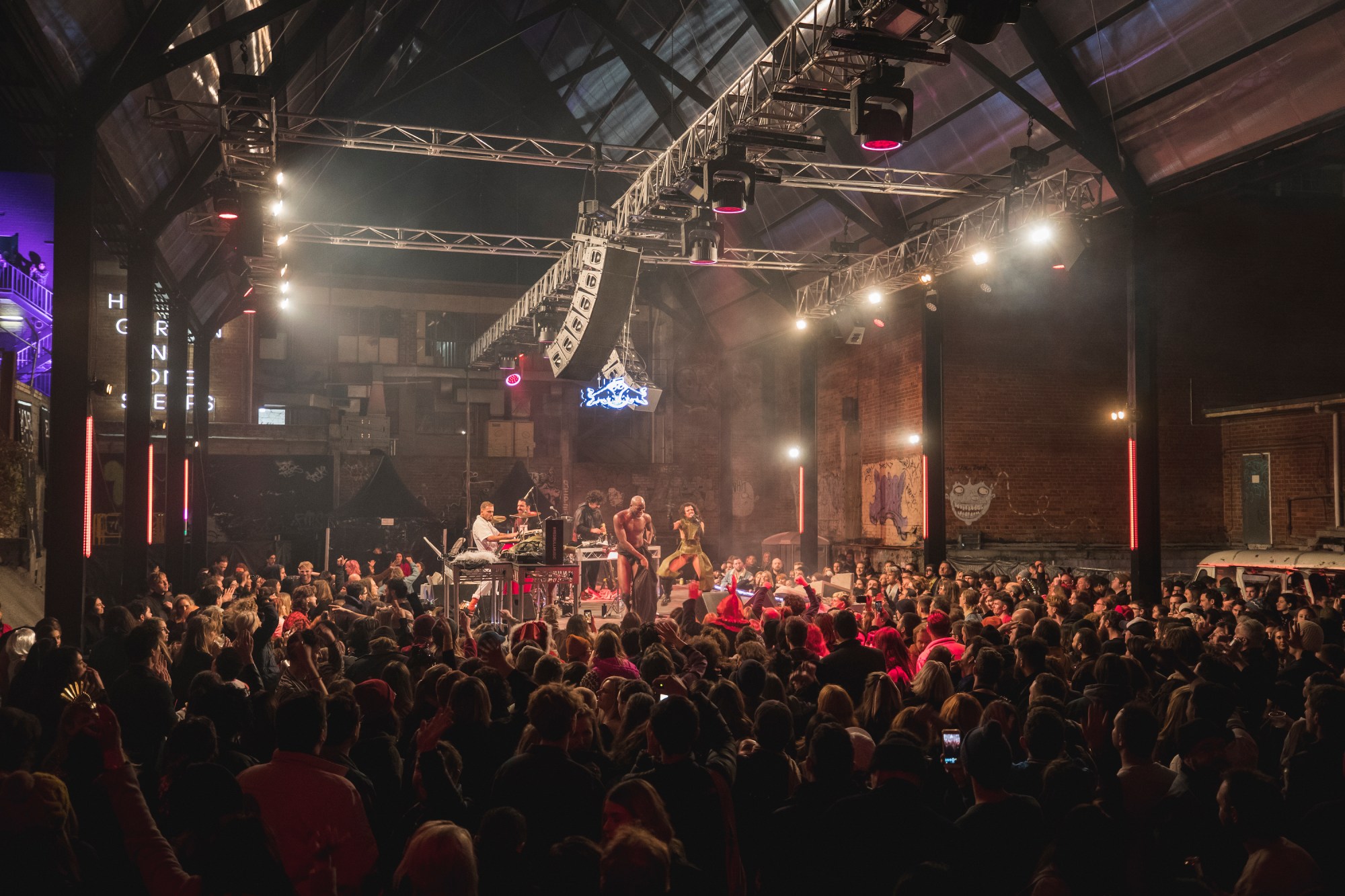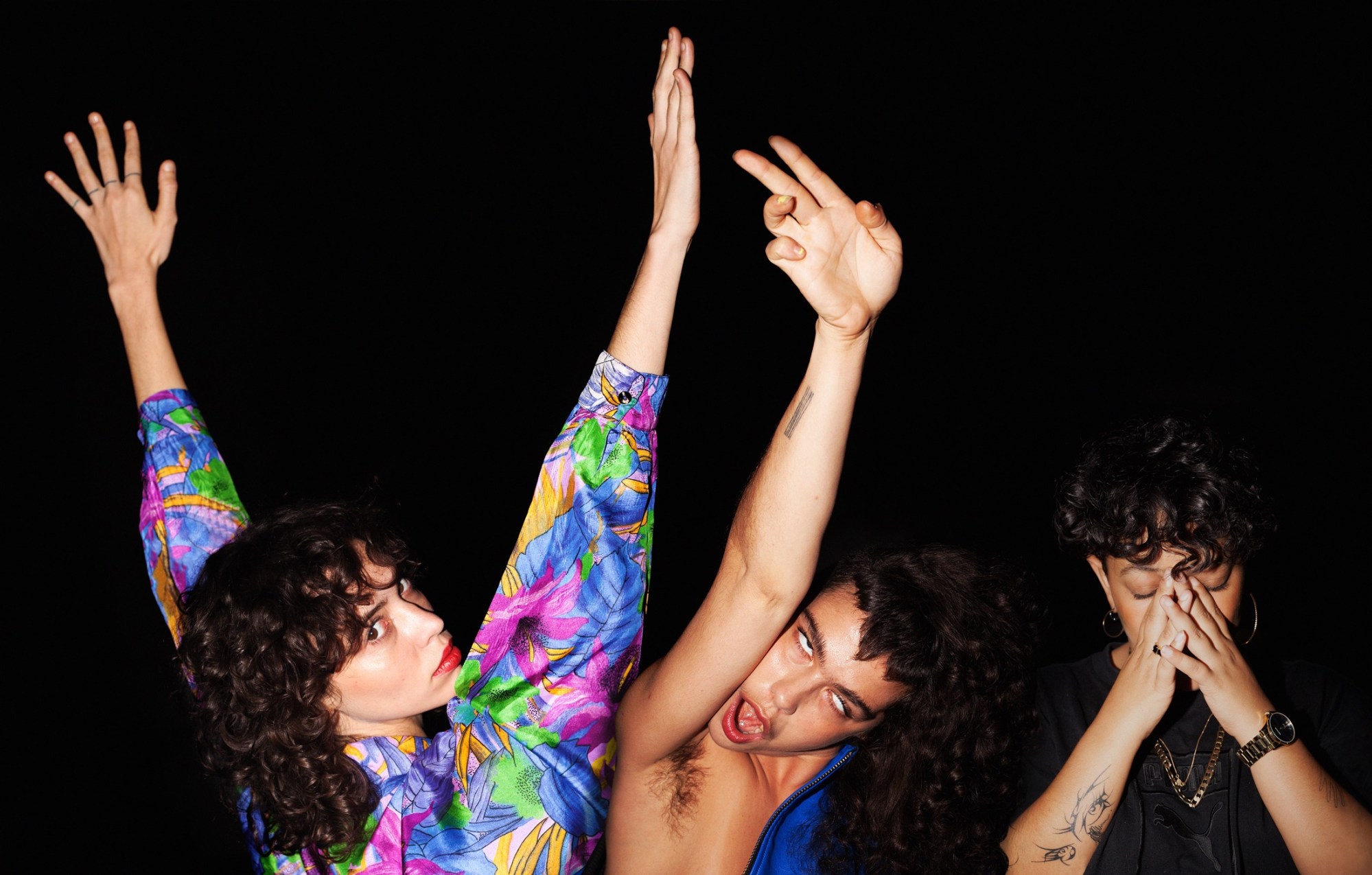Hobart is a quiet town with a population of two hundred thousand and a bubbling creative scene. São Paulo on the other hand is home to over twelve million and is a city that, due to extreme living conditions and a staunchly right-wing government, has given rise to some of the most radical underground parties in the world. Recently, the gap between these two cities was bridged, as three of Brazil’s defining countercultural voices travelled to Dark Mofo with Red Bull for Via São Paulo.
There was Cashu, a formidable DJ and one of two people behind Mamba Negra — a collective celebrated for their inclusivity who are at the centre of São Paulo’s anti-capitalist dance music scene. Joining her was Badsista, the founder of an active feminist collective called Bandida and a DJ fusing techno, house and baile funk, often at a dizzying rate of 160BPM. Completing the trio was five-piece performance art act Teto Preto, led by a fierce singer and performer named Laura Diaz. Back home in Brazil, they’ve seen their friends harassed and even killed under the country’s insidious anti-queer regime. They play music in resistance to this structure and throw huge parties where marginalised communities feel safe to let loose and be themselves entirely. In Tasmania, they brought this spirit to the stage, providing a glimpse into the special scene that they’re all key members of.
We spoke to Badsista, off the back of playing two epic sets on an outdoor stage surrounded by a sea of smiling faces, to find out what fuels her work and how she and her friends hope to make a difference.
It was such a treat for us to see you play on the Red Bull stage at Dark Mofo. How did you find it?
It was great. I played high-speed trance and Brazilian funk at 160BPM, which makes you feel like you’re in a kind of carnival. When I turn up the BPM, everything gets beautiful: the drum and the vocals all sound different. One of my highlights was the dancers — Kilia Tipa and Bhenji Ra who danced on stage with us, beautiful girls from Sydney. In São Paulo I’m surrounded by trans girls so it made me feel at home.

What’s it like playing baile funk, music that is inherently very political and meaningful in your country, in other contexts?
Playing at Dark Mofo, to an audience with money, I think it’s important to communicate the realities of my lifestyle to them — through the music, through movement, through dance. At home everyday we’re fighting for our right to live and I think this comes through in our music. I also am very conscious of the lyrics in the songs and whether they represent my beliefs. If you don’t understand everything that happens in Brazil, some of the music might seem too violent or sexual so I’m conscious of that when I play outside the country. It’s nice to play my music to people who aren’t as familiar with where it’s coming from. I want to be able to bring this music to people who might not otherwise hear it.
The parties you play in Brazil, like Mamba Negra and Batekoo, look like the most amazing time. Are you able to translate that elsewhere?
In Brazil what we see is so specific, especially when you see what’s happened to every part of the country. There are honestly things happening there not happening anywhere else in the world. So we have these parties and people go so crazy. They’re so free. You can feel the freedom. It’s the freedom to dance how you want, literally do whatever you want. If you’re feeling too hot, you can take your clothes off, dance in your bra, it doesn’t matter. They’re parties for black people, for queer people, for everyone. They’re parties made by and for smaller communities, we play funk and everybody knows how to dance. It’s amazing but it’s hard to translate that exact feeling. We try.

How was it playing with Cashu and Teto Preto on this trip?
I feel like being here with them is important because we are central pieces of the São Paulo music and art scene. Of course we’d like to bring everyone with us, all the people we play with, but I’m sure we can do that in the next years.
Can you tell us a bit about your collective Bandida and what you’re hoping to do with it?
It’s a collective of female DJs. As you can imagine, throwing parties is expensive and hard but I want to help teach these girls about how they might be able to get into it. I want to be able to help educate people. We managed to get government funding to buy equipment and now we have CDJs and speakers and we’ve started giving free DJ lessons around São Paulo. Growing up I never had anyone telling me I could do it, encouraging me or teaching me. I’ve always had to learn by myself. In the poor neighbourhoods in our country, you don’t have the means to get ahead so we’re hoping to do workshops in cultural spaces to encourage more people. We’ll ask them to write their name, where they’re from, how they identify. We’ll focus on women and minorities for these workshops.

That’s so special and is bound to help enable young people find networks and communities for themselves.
It’s small but it’s important to begin somewhere. Right now we’re teaching people to DJ and mix. Next year I want to give lessons in producing and how to record songs if you don’t have good quality equipment. Like, life hacks. The idea is, how you can use the things that seem to be against you. How can you turn that around. People from poor places know they’re not going to win. This is like a certainty you have when you’re born. I want people to learn a different way to win. We always have to think forward and imagine how we can work past our obstacles. I’m conscious of employing the girls I teach to play at parties with me too. We pay them and sometimes they’re earning money for the first time. Providing a platform for other girls is important. Being able to do things for people is important.
This year, Red Bull celebrated five years of programming at Dark Mofo with ‘VIA S ÀO PAULO’. VIA was a continued collaboration program that previously debuted VIA Alice at Red Bull Music Academy Weekender and Sugar Mountain Festival.
